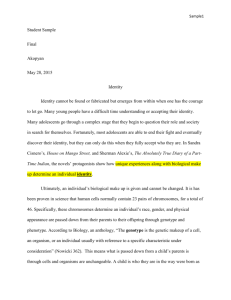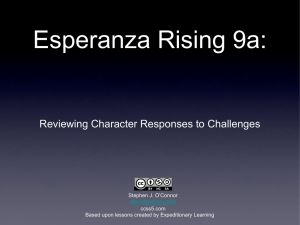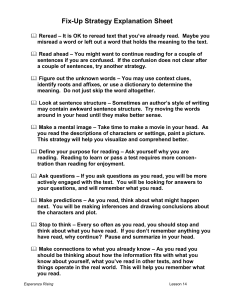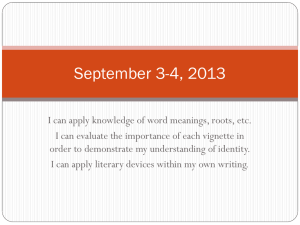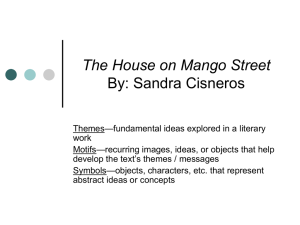EllisNottingham20150..
advertisement
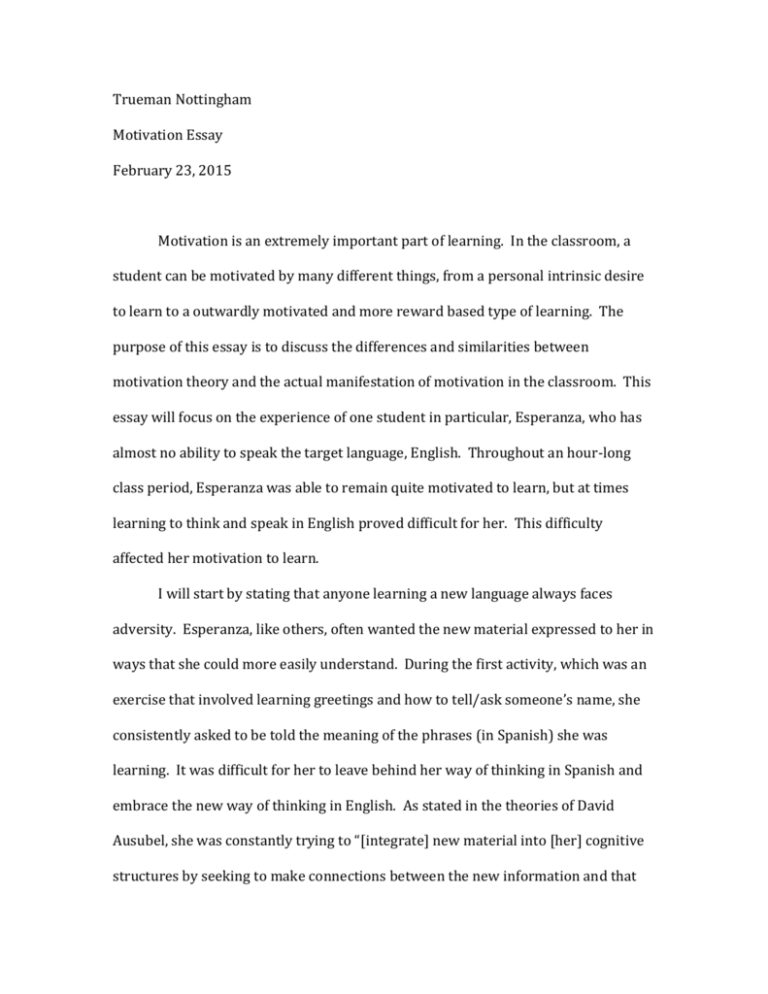
Trueman Nottingham Motivation Essay February 23, 2015 Motivation is an extremely important part of learning. In the classroom, a student can be motivated by many different things, from a personal intrinsic desire to learn to a outwardly motivated and more reward based type of learning. The purpose of this essay is to discuss the differences and similarities between motivation theory and the actual manifestation of motivation in the classroom. This essay will focus on the experience of one student in particular, Esperanza, who has almost no ability to speak the target language, English. Throughout an hour-long class period, Esperanza was able to remain quite motivated to learn, but at times learning to think and speak in English proved difficult for her. This difficulty affected her motivation to learn. I will start by stating that anyone learning a new language always faces adversity. Esperanza, like others, often wanted the new material expressed to her in ways that she could more easily understand. During the first activity, which was an exercise that involved learning greetings and how to tell/ask someone’s name, she consistently asked to be told the meaning of the phrases (in Spanish) she was learning. It was difficult for her to leave behind her way of thinking in Spanish and embrace the new way of thinking in English. As stated in the theories of David Ausubel, she was constantly trying to “[integrate] new material into [her] cognitive structures by seeking to make connections between the new information and that which they already know.” (Ausubel) Despite the very simple nature of the material being learned, Esperanza always tried to understand the phrases in English by converting them to her native tongue. Having spoken only Spanish for the past forty or so years, it was hardly surprising to see her fall back to her comfort zone, trying to understand the new material through her own language. It was interesting, however, to see how this affected her motivation. Although she had come to class to learn a new language, she had not yet let go of the one she had spoken fluently for so long. Throughout the lesson she would ask the teacher in Spanish “que quiere decir esto?” The teacher in turn would answer only in English. This frustrated Esperanza because she could not understand what the teacher was saying. However, I believe that had she let go of her own language and tried to begin thinking like an English speaker, her motivation levels would have been higher. All that being said, letting go of your own language is easier said that done. Esperanza was able to keep motivated throughout the entire lesson on almost enthusiasm alone, which was very impressive. In David McClelland’s work, he talks about the different types of people and what they are motivated by. Esperanza in many ways is what McClelland would call an “achievement motivated” person. This means exactly what it says; that she is motivated by her achievements alone, and likes being challenged by realistic goals rather than receive rewards for something she had done fairly easily (McClelland). One important thing I noticed about Esperanza was her reaction to positive feedback. She was often reluctant to accept the teachers encouraging comments that she was, for a beginner learning English for the first time, doing an amazing job. The challenges put in front of her were brand new and difficult to understand after only one class. As a teacher, we can see that, despite having trouble retaining all of the information she had been given, she was doing relatively well learning English for someone who had been speaking Spanish only for over 40 years. However, Esperanza did not share our unyielding faith and positivity. She was basing her feelings of success in the class solely on measurable “achievements”; i.e. her ability to speak English. When she was unable to remember a phrase or pronounce it correctly, she was discouraged and disappointed in herself. Positive feedback from the teacher only slightly changed her mind. This aspect of motivation is difficult to master, since a teacher can only continue to assure the student that she is doing well and hope that they eventually believe them. So why might Esperanza have had such a difficult time believing in the amount of progress she was achieving? As stated before, the achievements in language itself were relatively simple in nature. Learning to say, “Hello, my name is Esperanza” seems like an easy task when compared with learning an entire language. However, for a beginner, it’s quite difficult. I believe that Esperanza’s bouts of frustration were due to a lack of self-confidence in her English-speaking side. As a Spanish speaker, she is funny, extroverted, and happy. She can make people laugh, have comfortable and endearingly friendly conversations, and express herself in many different ways. It’s a difficult task for her to let go of this side of herself, to develop a new, English-speaking, Esperanza. Imagine starting your whole life anew, abandoning the language you have used your whole life to re-learn the most basic forms of self-expression. This is exactly what Esperanza does in English class. Abraham Maslowe states in his hierarchy of needs that before cognitive growth can occur, the basic needs below it must first be achieved. True, Spanishspeaking Esperanza had confidently decided that she wanted to learn English. But once the class had started, English-speaking Esperanza began to feel quite insecure. Having difficulty learning phrases as simple as “Hello, my name is Esperanza” was an extremely humbling experience. I believe that the reason Esperanza had such a hard time accepting praise was simple; she didn’t yet believe in herself. She clung desperately to her Spanish-speaking mind, with which she was so comfortable. Of course she did; it’s all she’s ever known. However, once she comes to terms with starting over and finds comfort with being a beginner, Esperanza will surpass the limits of self-esteem and achieve whatever goal she sets. It will just take a little practice. Bibliography 1. David Ausubel Instructionaldesign.org (1968) David Ausubel – Subsumption Theory. (online) Available at: http://www.instructionaldesign.org/theories/subsumption-theory.html 2. Abraham Maslow Businessballs.com (1940) Abraham Maslow – Hierarchy of Needs and Diagrams of Maslows Motivational theory – Pyramid Diagrams of Maslows Theory. (online) Available at: Http//www.businessballs.com/maslow.htm 3. David McClellend Businessballs.com (1941) David McClellend – Achievement Motivation Needs Theory. (online) Available at: Http//www.businessballs.com/davidmcclellend.htm

